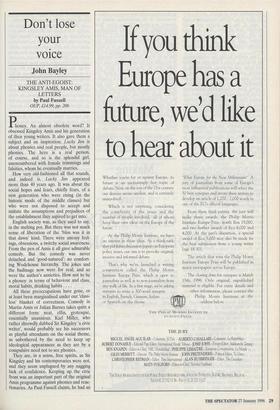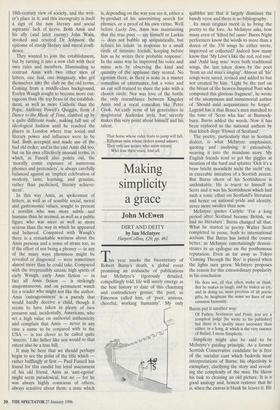Don't lose your voice
John Bayley
THE ANTI-EGOIST: KINGSLEY AMIS, MAN OF LEI-YEAS by Paul Fussell OUP, £14.99, pp. 206 Phoney. An almost obsolete word? It obsessed Kingsley Amis and his generation of then young writers. It also gave them a subject and an inspiration. Lucky Jim is about phonies and real people, but mostly phonies. The hero is a real person, of course, and so is the splendid girl, unencumbered with female trimmings and falsities, whom he eventually marries.
How very old-fashioned all that sounds, and indeed is. Lucky Jim appeared more than 40 years ago. It was about the social hopes and fears, chiefly fears, of a new generation who were rising (in the historic mode of the middle classes) but who were not disposed to accept and imitate the assumptions and prejudices of the establishment they aspired to get into.
English society was, as they used to say, in the melting pot. But there was not much sense of liberation of the 'bliss was it in that dawn' kind. There were uneasy feel- ings, obsessions, a twitchy social awareness. From the pen of Amis it all gave admirable comedy. But the comedy was never detached and 'good-natured': no comfort- ing Wodehouse hierarchy. The jokes and the badinage now were for real; and so were the author's anxieties. How not to be a phoney: in terms of behaviour and class, moral habits, drinking habits . . . .
All these preoccupations have gone, or at least been marginalised under our 'class- less' blanket of correctness. Comedy in Martin Amis or Julian Barnes takes quite a different form: neat, elfin, grotesque, essentially unanxious. Karl Miller, who rather shrewdly dubbed Sir Kingsley 'a civic writer', would probably see his successors as playful attendants on the social theme, as unbothered by the need to keep up ideological appearances as they are by a compulsive need not to see phonies.
They are, in a sense, free spirits, as Sir Kingsley and his contemporaries were not, and they seem unplagued by any nagging lack of confidence. Keeping up the civic front was an important part of the original Amis programme against phonies and reac- tionaries. As Paul Fussell claims, he had an 18th-century view of society, and the writ- er's place in it; and this incongruity is itself a sign of the new literary and social aspirants' lack of nerve. Both Amis and his ally (and later enemy) John Wain, invoked and revered Dr Johnson: the epitome of sturdy literary and moral confi- dence.
They wanted to join the establishment, but by turning it into a new club with their own rules and members. Illuminating to contrast Amis with two other men of letters, one real, one imaginary, who got themselves into the club on the old terms. Coming from a middle-class background, Evelyn Waugh sought to become more out- rageous than the top brass of the establish- ment, as well as more Catholic than the Pope. Anthony Powell's Quiggin, from A Dance to the Music of Time, climbed up by a quite different route, making full use of ideological fashion until he reached the places in London where true social and literary power and influence were to be had. Both accepted and made use of the bad old order; and in the end Amis did too, but on his own effectively unusual terms, in which, as Fussell also points out, the `morally comic exposure of numerous phonies and pretenders', is always carefully balanced against an 'implicit celebration of modesty, taste, learning, and genuine, rather than puolicised, literary achieve- ment'.
In this way Amis, as spokesman of letters, as well as of sensible social, moral and gastronomic values, sought to present a novelist who was more subtle and humane than he seemed, as well as a public figure who was nicer as well as more serious than the way in which he appeared and behaved. Compared with Waugh's there is a remarkable wariness about the Amis persona and a sense of strain too, as if the effort of not being a phoney — in any of the many ways phoniness might be revealed or diagnosed — were sometimes almost more than he could take. Compared with the irrepressibly satanic high spirits of early Waugh, early Amis fiction — in fact all Amis fiction — is strikingly unspontaneous, and on permanent watch for a reader who might not like the author. Amis 'outrageousness' is a parody that would hardly deceive a child, though it seems to have taken in plenty of bien pensants and, incidentally, Americans, who set a high value on authorial authenticity and complain that Amis — never in any case a name to be conjured with in the USA — is too clever to be called quite `sincere.' Like father like son would to that extent also be a true bill.
It may be here that we should perhaps begin to see the point of the title which rather bafflingly at first — Paul Fussell has found for this candid but loyal assessment of his old friend. Amis as `anti-egotist' might seem paradoxical, but no — for he was always highly conscious of others, always sensitive about them: a state which is, depending on the way you see it, either a by-product of his unremitting search for phonies, or a proof of his own virtue. Well before Lucky Jim, Amis was maintaining that the true poet — say himself or Larkin — does not bubble up solipsistically, but refines his talent 'in response to a small circle of intimate friends, keeping before him as he writes their probable response'. In the same way he improved his voice and mime acts by observing the kind and quantity of the applause they scored. No egotism there, as there is none in a master comedian or entertainer, but a voice and an ear self-trained to share the joke with a chosen circle. Nor was love of the bottle the only resemblance between Kingsley Amis and a vocal comedian like Peter Cook. An early verse of his generalises in magisterial Audenian style, but secretly makes this very point about himself and his talent.
That horse whose rider fears to jump will fall, Rifleman miss whose orders sound unsure; They only are secure who seem secure; Who lose their voice, lose all.



























































 Previous page
Previous page